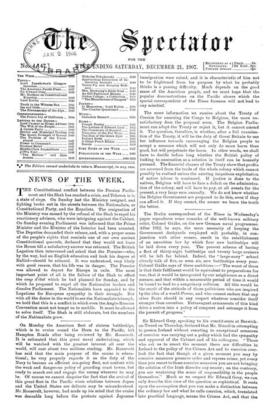NEWS OF THE WEEK.
THE Constitutional conflict between the Persian Parlia- ment and the Shah has reached a crisis, and Teheran is in a state of siege. On Sunday last the Ministry resigned, and fighting broke out in the streets between the Nationalists, or Constitutional Party, and the Royalists. The resignation of the Ministry was caused by the refusal of the Shah to expel his reactionary advisers, who were intriguing against the Cabinet. On Sunday evening Parliament was informed that the Prime Minister and the Minister of the Interior had been arrested. The Deputies demanded their release, and, with a proper sense of the people's rights that reminds one of our own ancient Constitutional quarrels, declared that they would not leave the House till a satisfactory answer was returned. The British Legation then intervened and asked that the Premier—who, by the way, had an English education and took his degree at Balliol—should be released. It was understood, very likely with good reason, that his life was in danger. The Premier was allowed to depart for Europe in exile. The most important point of all is the failure of the Shah to effect the coup dgtat which he bad planned for Sunday, and by which he proposed to expel all the Nationalist leaders and dissolve Parliament. The Nationalists have appealed to the Legations for European sympathy in their struggle. But with all the desire in the world to see the Nationalists triumph, we hold that this is a conflict in which even the Anglo-Russian Convention must not tempt us to meddle. It must be allowed to solve itself. The Shah is still obdurate, but the numbers of the Nationalists grow.














































